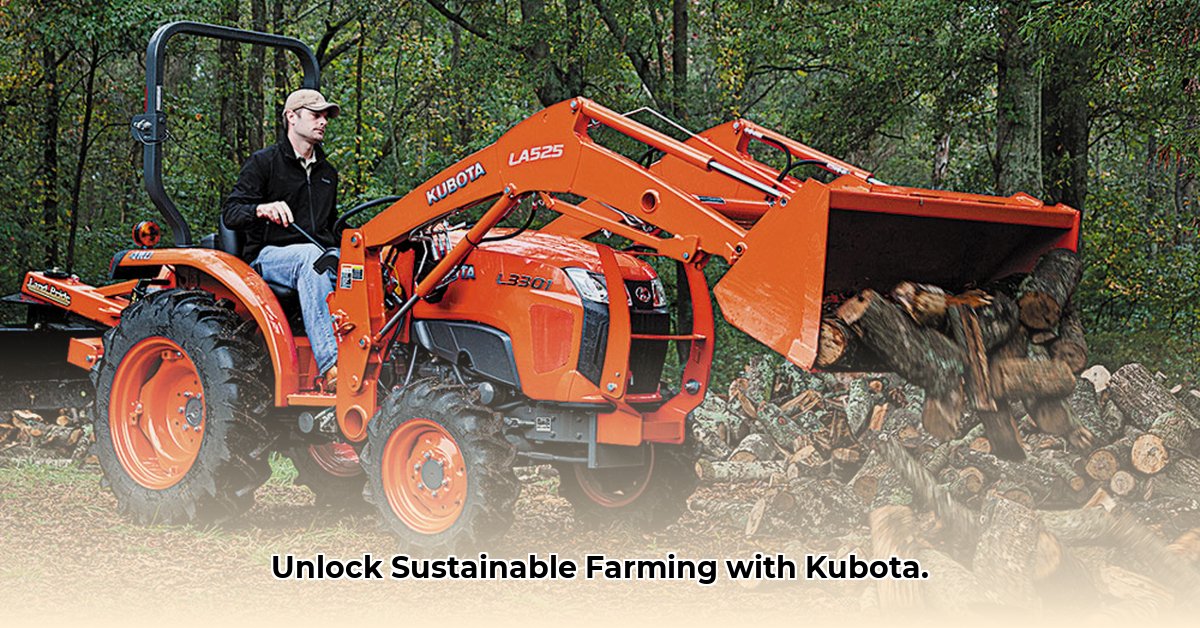
Farming is evolving. It's no longer just about planting and harvesting; it's about doing it smarter and more sustainably. Kubota farm tractors, equipped with cutting-edge technology, are at the forefront of this revolution. This article explores how Kubota's precision agriculture solutions are transforming sustainable farming practices, offering both seasoned professionals and newcomers a comprehensive guide to enhancing yields and protecting the environment. For more information on Kubota's M4 tractor, visit this helpful resource.
Precision Farming: A Smarter Approach to Agriculture
Imagine applying fertilizer only where your crops need it, minimizing waste and environmental impact. That's the power of precision agriculture, enabled by Kubota tractors equipped with GPS, smart sensors, and automated systems. These technologies optimize every stage of the farming process, from planting to harvesting, ultimately resulting in healthier crops, larger yields, and a smaller environmental footprint. This data-driven approach allows for more informed decision-making, maximizing efficiency and sustainability. But how does it work in practice? Let's delve into the specifics.
How Kubota Tractors Enhance Sustainable Farming
Kubota tractors are more than powerful machines; they're key tools for a greener future. They contribute to sustainability in several critical ways:
Cost Savings: Precise application of resources—fertilizers, pesticides, seeds, water—minimizes waste, directly lowering input costs. You only pay for what your crops actually need. This translates to significant long-term economic benefits.
Environmental Protection: Reduced chemical runoff leads to cleaner water, healthier soil, and a more sustainable ecosystem. Less pollution contributes to a healthier planet for all.
Increased Yields: Optimized resource use leads to healthier plants, resulting in higher yields and potentially increased profits. This means more food for a growing global population.
Improved Efficiency: Features like auto-steer and automated controls save valuable time and labor, allowing farmers to focus on other crucial tasks. This increase in efficiency translates to time and cost savings.
Data-Driven Decision Making: Modern Kubota tractors collect valuable field data (soil conditions, crop health, yield variations) that can be analyzed to further refine farming practices and maximize efficiency and sustainability.
Is the investment in precision agriculture worth it? The data overwhelmingly suggests "yes." Studies show that precision farming techniques can increase yields by 10-20% while reducing input costs by a comparable margin. These improvements are significant enough to offset the initial cost of investment in many cases.
Addressing the Challenges of High-Tech Farming
While the advantages of precision farming with Kubota tractors are evident, transitioning to this technology presents certain challenges:
Pros and Cons of Precision Agriculture with Kubota Tractors
| Feature | Advantages | Disadvantages |
|---|---|---|
| Initial Cost | Long-term cost savings often exceed initial investment; potential subsidies available. | Significant upfront investment; may require financing. |
| Technology | Increased efficiency, yield, and reduced environmental impact. | Requires training and technical expertise; potential for malfunctions. |
| Data Management | Provides valuable insights for improved decision-making. | Requires effective data analysis and management skills; data security is crucial. |
A Practical Guide to Implementing Precision Farming
Ready to upgrade your farming practices? Follow these steps for a smoother transition:
Assess Your Needs: Carefully evaluate your current practices. Identify areas where precision tools offer the most significant improvements. Focus on your biggest challenges first.
Explore Kubota's Offerings: Kubota provides a wide range of tractors and technology packages. Research options that align with your farm's size, crops, and budget. Networking with other Kubota users can prove invaluable.
Invest in Training: Kubota offers training programs to familiarize farmers with new technologies. Taking advantage of these resources ensures you maximize your investment.
Start Small: Don't feel pressured to overhaul everything at once. Begin with a smaller field or a specific aspect of your operation to gain experience and confidence.
Continuous Monitoring and Adaptation: Precision farming is an ongoing process. Track results, analyze data, and adapt your approaches based on what works best.
The Future of Sustainable Agriculture: Kubota's Role
The future of farming is inextricably linked to precision agriculture. Kubota tractors are playing a vital role, enabling farmers to work more efficiently, sustainably, and profitably. While challenges remain, the shift toward precision farming is undeniable. It represents a change in mindset—embracing data-driven decisions, environmental responsibility, and a long-term vision for sustainable agricultural practices. Kubota is leading the charge in this evolution.
"Kubota's commitment to innovation in precision agriculture is crucial for the future of sustainable farming," says Dr. Emily Carter, Professor of Agricultural Engineering at the University of California, Davis. "Their technology empowers farmers to optimize resource use and minimize their environmental impact, leading to a more resilient and productive agricultural sector."
Financing Precision Agriculture for Smallholder Farmers
Accessing the capital needed for precision agriculture equipment can be a significant hurdle for smallholder farmers. However, several financing options exist:
Government Programs: Agencies like the USDA offer loan programs with favorable terms. However, eligibility requirements can be complex.
Private Lenders: Banks and credit unions offer equipment loans and leases, though they often require strong credit and detailed business plans.
Leasing: Leasing reduces upfront costs, but you don't own the equipment at the end of the lease.
Grants and Subsidies: Explore grants specifically designed to support sustainable agriculture technologies.
A well-crafted business plan highlighting the financial and environmental benefits of your investment significantly increases your chances of securing funding. Remember, investing in precision agriculture is a long-term investment with substantial potential returns.